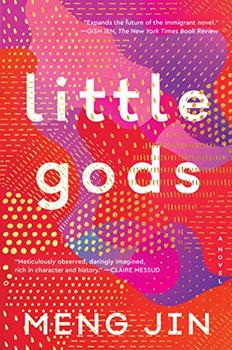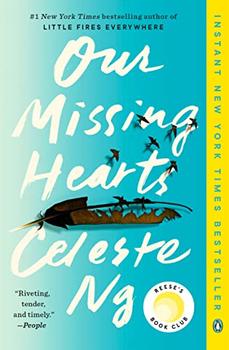Summary | Excerpt | Reading Guide | Reviews | Beyond the book | Read-Alikes | Genres & Themes | Author Bio

Little Gods, Meng Jin's intricate, emotionally intelligent debut, opens with a scene in which physicist Su Lan gives birth in Beijing in 1989. Through the eyes of a nurse working the night shift, we learn that inside the hospital, Su Lan is abandoned by her husband, while outside, the violence of the June 4th Tiananmen Square Massacre (see Beyond the Book) erupts around her. The narrative then skips forward 17 years to Su Lan's death.
The novel unfolds in a non-linear fashion; in the opening chapters we're introduced to a shadow of the woman that Su Lan becomes—a distant, hardworking single mother—before we delve into the past and begin to reconstruct her character. There are multiple narrators, all of whom played a role in Su Lan's life—some of these roles more significant than others. As we hear from Su Lan's neighbor, daughter, and former lover, a clearer portrait of this complex woman starts to form. Su Lan was brilliant, by all accounts, but desperately unhappy, and driven by a desire to leave China and start a better life for herself. This goal would only half come true, as she did successfully immigrate to America but with her infant daughter in tow, she was never able to fully realize her ambitions as a physicist.
The contradictory roles that she played throughout her life are shown clearly through the different characters who hold their own lives up as a mirror against Su Lan's. This is reflected upon most explicitly by the first narrator, Zhu Wen, an elderly woman with a physical deformity who found herself drawn to Su Lan when she moved in next door.
From the very beginning Su Lan had seen herself in my disfigured face, had seen the truth of what she was in my lopsided body. You look like someone I've always known, she'd said that day, the day she painted the room white, and she had meant it. In her mind we belonged to the same class of people, but it was not as I'd secretly hoped, that somehow she'd glimpsed her beauty in me, that hers was the body in which my mind and self belonged. No, she saw herself as a disposable, hideous human. To the world Su Lan was beautiful but to herself she was a monster, and her greatest fear was that this monster would be revealed.
Little Gods is about the multiplicity of the self; it's about the sides of ourselves that we choose to hide and the sides we choose to show, and to whom.
As Su Lan was never able to find contentment—always moving, always searching—this is a novel about movement, immigration, culture and belonging. The sharp contrast between U.S. and Chinese culture is a thread that runs through the narrative, but this tension is only perceived by Liya, Su Lan's daughter, who was raised in America and visits China for the first time in over a decade only after Su Lan dies. The rest of the characters who narrate the story, all an older generation, have lived their entire lives in China, and knew Su Lan only as the woman she was before she left. Only Liya knows the woman that her mother became in America, but finds herself unable to reconcile what she already knows about her mother with what she discovers.
The panoply of narrators naturally means that certain sections are more successful than others; certain voices are more compelling, certain storylines feel more relevant. But when viewed as a whole, Little Gods is like a jigsaw that falls into place as soon as you close the final page. An intricate novel about grief, loss, memory and the self as it relates to one's culture, Little Gods is a smart, emotionally charged novel that at times is nearly as elusive as Su Lan's character, but well worth the effort.
![]() This review was originally published in The BookBrowse Review in February 2020, and has been updated for the
January 2021 edition.
Click here to go to this issue.
This review was originally published in The BookBrowse Review in February 2020, and has been updated for the
January 2021 edition.
Click here to go to this issue.

If you liked Little Gods, try these:

by Wiz Wharton
Published 2025
Set between the last years of the "Chinese Windrush" in 1966 and Hong Kong's Handover to China in 1997, a mysterious inheritance sees a young woman from London uncovering buried secrets in her late mother's homeland in this captivating, wry debut about family, identity, and the price of belonging.

by Celeste Ng
Published 2023
From the #1 bestselling author of Little Fires Everywhere, comes one of the most highly anticipated books of the year – the inspiring new novel about a mother's unbreakable love in a world consumed by fear.
If passion drives you, let reason hold the reins
Click Here to find out who said this, as well as discovering other famous literary quotes!
Your guide toexceptional books
BookBrowse seeks out and recommends the best in contemporary fiction and nonfiction—books that not only engage and entertain but also deepen our understanding of ourselves and the world around us.